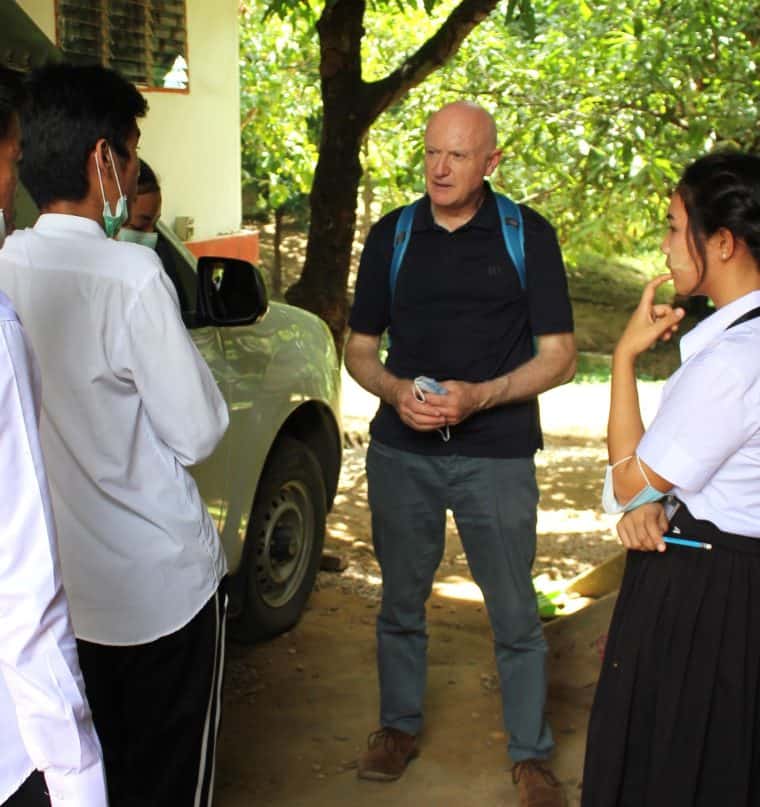As the year came to an end, we sat down with one of the most important individuals in our organisation—Peter, our CEO. I sat down in front of my laptop, eager to get into the interview and ask all the questions I’d prepared; Peter is the sort of person you can listen to for hours, his seemingly never-ending arsenal of interesting stories like having drinks with Harry Styles or organising a birthday visit for Prince Edward. Having spent 30 years in the sector starting as youth and community development worker, he spent time helping the youth and engaging with communities. Having joined Safe Child Thailand 5 years ago, there has been a lot of change for the organisation as well as for him; stepping in at a time where the organisation as a whole was being restructured—its both a point of rejuvenation and immense fragility. He took a step back to evaluate what the children in institutional care needed and how Safe Child Thailand could help them. And over 4 years, the team have implemented a much needed shift, keeping in mind the context and that strategic change can never be overnight, within the organisation that can be seen the work that they do.

As a part of this, the Thai government are both hesitant yet committed to making a change. And recognising that these children are living in care and that system needs to be reformed is a definitely a start. For Peter, being in the sector is all about helping the youth. In the time spent working in this sphere he’s come across a fair few hurdles—in particular related to political obstacles, as we chatted he recalled the many political challenges. One example was Section 28, 35 years ago, the hurdle that stood in the way of children getting education about sexuality. These political obstacles have been ever-present throughout his career, including most recently Care Reform where local governments are not one hundred percent on board with bringing in change. Peter’s insight into funding issues, like for a majority of the sector, are still very much a hurdle—and only more information and research can bring more funding for a topic like care reform. Another hurdle we discussed, and I could relate to as being a new entrant into the realm of jobs, was setbacks and how resilience and having a strong support system—a safety net around yourself—was immensely important to get through those setbacks and realise that you’ll be fine. And when you are working, having the right motivation really matters; for Peter, the day you stop caring about the people, when there is no empathy left would be a worrying day for someone within the sector.
Having spent time on the ground in Thailand, I asked Peter what his most memorable experience was—and his answer was absolutely enthralling. He talked about a woman who came up to him in a village and held out her arms, giving him a big hug. She told him how she’d waited so long to see him again, as they’d met in a previous life. Peter talked about the importance of knowing other cultures, but he also talked about the uncanny feeling of knowing her too—and this was special. Peter also pointed out that impact is not always immediate. Recently, a person he worked with and diagnosed with schizophrenia 20 years ago, found Peter on LinkedIn and said that he saved her life by referring her to the right services and the help she needed, and is now a successful doctor. The positive work paid off in the right ways, and that one decision 20 years ago saved someone’s life, and gave them a much better quality of life.
As our interview came to a close, we spoke about the future of Safe Child Thailand—and he was just as passionate about Care Reform, the journey, and the work done in that sphere must continue. For him, constant self-reflection dictates his future as well. As a CEO, he must ask himself if he’s still the best person for a job at a point in time—and if not, then the willingness must be there to step away in order for the work to continue. As we talked a bit about my career ambitions, he jokingly said he had one more job in him and then he’d hand it over to my generation—this resonated with me deeply, as it reminded me of how he’d emphasised the importance of young people and how they are the future. For Peter, you’re part of a cycle—a cycle of work, a cycle of careers, and a cycle of life. The most important thing is to support children, to make sure they are in safe environments as they have a massive role to play in their own futures and others’ futures; Finally, Peter left me with a very poignant question—how can we talk about the future without talking about children?

Author’s bio:
As a masters student nearing the end of my degree, one of the most important and meaningful things I did during my year, was being a part of the English Conversation Mentor Programme. Now working as a Youth Ambassador, I am thrilled to continue my journey with Safe Child Thailand on this project that aims to reflect on the work we do, along with a focus on the ground reality and stories that shed light on the children and staff that are at the centre of this organisation.

